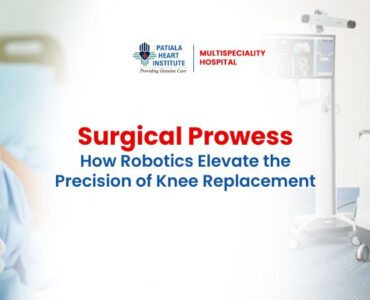Over 15 crore Indians suffer from one or other kind of knee-related problem, and most of them are over 50. In addition, about 4 crore patients require Total Knee Replacement (TKR) surgery.
While knee-related problems are on the rise in India, people continue to live with the pain rather than considering knee replacement surgery because of myths related to knee replacement surgery and life after surgery.
In this blog, we will debunk the 10 most common myths about knee replacement surgery to help you make an informed decision about your health.
Myth 1: Knee Replacement Surgery is only for Older People
It is a common misconception that knee replacement surgery is only for older people. Knee problems can affect people of all ages, from athletes to people with medical conditions. In fact, knee-related issues in younger people are rising due to factors like obesity, injuries, a sedentary lifestyle, and arthritis.
Age is not the sole criterion when deciding the candidacy for knee replacement surgery. Instead, the decision to undergo knee replacement surgery is based on various factors, including the severity of the problem, the extent of pain and discomfort, and how it impacts the patient’s quality of life. Knee replacement surgery is recommended for people with severe knee problems that haven’t responded to other treatment options like medication, lifestyle changes, and physical therapy.
Myth 2: Knee Replacement Surgery is a very Risky Procedure
It is a common myth that knee replacement surgery is a very risky procedure. While all surgeries carry some risk, knee replacement surgery has a very low complication rate.
Some risks associated with knee replacement surgery or any other surgery may include infection, blood clot formation, implant failure, or nerve damage. However, these risks are rare and can be minimized with proper pre-operative preparation, surgical technique, and post-surgery care.
Thanks to modern surgical techniques and technological advancements, the risks associated with knee replacement surgery have been significantly reduced. Techniques like computer-assisted or robot-assisted surgeries have improved accuracy by reducing the risk of implant failure.
Myth 3: The Success Rate of Knee Replacement Surgery is very Low
This is another very common misconception about knee replacement surgery. In fact, knee replacement is a safe and effective treatment option for damaged, diseased, or worn-out knees. The success rate of knee replacement surgery is 95%, and 85% of artificial knee implants work even after 20 years.
The success rate of knee replacement surgery largely depends on the severity of the problem, the patient’s overall health, post-operative care, and the quality of implants.
Myth 4: TKR should be Avoided as Long as Possible
Many people with severe knee problems and mobility issues may believe that knee replacement surgery should be avoided as long as possible and should only be considered as a last resort. Knee replacement surgery should not be delayed as waiting too long to undergo surgery can lead to additional complications and a longer recovery time.
In many cases, delaying TKR surgery can result in further damage to the joints, making the surgery more complex and reducing the chances of success. Delaying surgery can also result in prolonged pain and limited mobility, reducing the patient’s quality of life.
Hence, it is important for people with chronic knee issues to consult an experienced orthopedic surgeon to evaluate the patient’s condition and overall health to determine the best course of action.
Myth 5: Knee Implants don’t Last for more than 10 Years
This is a myth based on outdated information. In the past, knee implants were made of materials susceptible to wear and tear, which resulted in shorter lifespans. However, with advancements in medical technologies, knee replacement components are made from highly durable materials, such as metal and ceramic, that can last for decades with proper care and maintenance. In fact, over 85% of people experience successful outcomes with knee replacement that last longer than 20 years.
The lifespan of a knee implant depends on various factors, including the patient’s age, weight, activity level, and overall health. In addition, following post-surgery instructions and attending follow-up appointments with the orthopedic surgeon can ensure the longevity of knee replacements.
Myth 6: Knee Replacement Surgery is very Expensive
While the cost of knee replacement surgery may be a concern for many patients, it is important to understand that cost of knee replacement surgery in India is less than in other countries.
The cost of knee replacement depends on various factors, such as your location, the severity of the damage, the type of procedure, your overall health, and the type of prosthesis being used.
Myth 7: People with Diabetes or Hypertension, or Heart Ailments cannot undergo TKR
It is no longer a problem to undergo surgery if you have high blood pressure or heart problems. Every patient undergoing a replacement surgery now receives a detailed pre-anesthetic checkup. Several tests (Echocardiography, Dobutamine stress echocardiography, Thallium stress echocardiography, etc.) are conducted before surgery to assess cardiac function.
In contrast to untreated heart disease patients, people with treated heart conditions (such as stenting or bypass grafts) are better candidates for surgery. Knee replacements can improve one’s health and help manage diabetes, hypertension, and heart disease, as one can walk without pain and walk for long distances if needed.
Myth 8: Recovery after Knee Replacement Surgery takes Months
Patients will be able to walk with assistance on the same day after the surgery, while the complete recovery after a knee replacement surgery or any surgery takes some time.
The recovery timeline can vary depending on individual factors such as age, overall health, and type and extent of surgery can impact the length of the recovery process. However, with modern-day pain management techniques and proper care, patients can return to normal life within a few weeks of surgery. It is important to follow the post-operative instructions given by the surgeon and attend physical therapy sessions to aid the recovery process.
Myth 9: You cannot Drive after Knee Replacement Surgery
It is another common myth that knee replacement surgery hinders a person’s ability to drive a car. In fact, driving a car can become easier after the surgery as you will have better mobility.
However, orthopedic surgeons recommend patients wait until their progress has been evaluated before resuming driving. Generally, patients can resume driving within 6 to 8 weeks of driving, but the time frame may vary depending on individual recovery.
Myth 10: Both Knees cannot be Replaced at the Same Time
The orthopedic surgeon will evaluate the patient’s overall health to determine whether the patient should undergo one knee replacement or both at the same time. In fact, there are many benefits of having both knees replaced at the same time, such as
- shorter hospital stays
- recovery time will be the same for both knees
- reduced surgery expenses
- physiotherapy for both knees will be at the same time
Knee replacement surgery can be life-changing for people suffering from chronic knee pain and limited mobility. With the most common myths debunked, you can understand that it is a safe and effective way to alleviate pain and improve your quality of life. Don’t let these myths hold you back from living the life you deserve.
If you or a loved one suffers from joint pain or other orthopedic issues, don’t hesitate to schedule a consultation with the expert orthopaedic team at Patiala Heart Institute.







